Indonesia is moving towards a cleaner energy future, and a key part of this transition is making sure its workforce is equipped with essential skills to be able to adapt with the evolving landscape. To address this key requirement, the Southeast Asia Energy Transition Partnership (ETP) launched the “Specialised Workforce for Indonesia’s Future Transition (SWIFT) in Energy Roadmap 2025–2060” project.

This national roadmap delivers practical policy recommendations to help create a diverse and skilled workforce ready to support Indonesia’s clean energy goals. The SWIFT Roadmap is a collaborative effort, and was developed as part of the Specialised Workforce for Indonesia’s Future Transition in Energy project, with support from the ETP and in partnership with The Center for Human Resources Development for Electricity, New Energy, Renewable Energy, and Energy Conservation (PPSDM KEBTKE). The roadmap document was officially handed over to the Agency for Human Resource Development of Energy and Mineral Resources (BPSDM ESDM) of the Ministry of Energy and Mineral Resources.
“By launching this National Roadmap for Human Resource Development, we’re taking a clear step to ensure Indonesia’s workforce is ready to support the country’s energy transition,” said Prahoro Yulijanto Nurtjahyo, Ph.D., Head of the Human Resource Development Agency on Energy and Mineral Resources. He emphasized the importance of collaborative work and using reliable data, noting that this helps improve documentation and development of information over time, as and when new insights are added.
Following the handover ceremony, Neyen Consulting and the Purnomo Yusgiantoro Centre (PYC), who are implementing partners for the SWIFT project, delivered presentations in which they provided further details on the roadmap. Massita Ayu Cindy from PYC discussed the roles of various institutions in developing the energy sector workforce in Indonesia. Jeremy Buhain from Neyen Consulting then presented the specifics of the SWIFT in Energy Roadmap 2025–2060.


The roadmap is built around six main areas designed to guide different ministries in preparing a workforce for Indonesia’s changing energy sector. These areas cover different aspects of workforce development, including:
- Improving the Institutional Framework
- Improving Quality of Training Programs and Strengthening Certification
- Promoting Data-Driven Green Job Market Structuring
- Promoting Inclusive Workforce Development
- Increasing Investments in Green Skills Development
- Enhancing Partnerships
Based on projections from the Ministry of Energy and Mineral Resources (MEMR), the roadmap expects about 1.26 million jobs to be created by 2060. This highlights the significant opportunities and the workforce changes needed for Indonesia to move to a cleaner energy system. The roadmap is structured into three phases—short-term (2025–2030), medium-term (2031–2045), and long-term (2046–2060)—and is designed to adapt as Indonesia’s energy transition progresses and labor market needs change.




